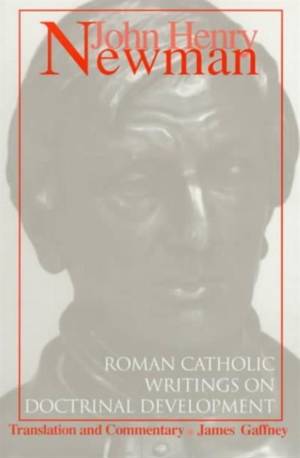
Bedankt voor het vertrouwen het afgelopen jaar! Om jou te bedanken bieden we GRATIS verzending (in België) aan op alles gedurende de hele maand januari.
- Afhalen na 1 uur in een winkel met voorraad
- Gratis thuislevering in België vanaf € 30
- Ruim aanbod met 7 miljoen producten
Bedankt voor het vertrouwen het afgelopen jaar! Om jou te bedanken bieden we GRATIS verzending (in België) aan op alles gedurende de hele maand januari.
- Afhalen na 1 uur in een winkel met voorraad
- Gratis thuislevering in België vanaf € 30
- Ruim aanbod met 7 miljoen producten
Zoeken
John Henry Newman
Roman Catholic Writings on Doctrinal Development
Paperback | Engels
€ 30,95
+ 61 punten
Omschrijving
John Henry Newman's decision to become a Roman Catholic was confirmed by his work on one of his major contributions to theology, Essay on the Development of Christian Doctrine. Ironically, the writings that brought him into the Catholic Church were viewed so suspiciously by Church officials that from his very first days as a Catholic he experienced distance, avoidance, distrust, and even cynicism in his relationship with the hierarchy. In hope of obtaining an honest and competent critique of his views on the development of doctrine, he conceived the idea of a presentation of his ideas, not in English, but in Latin, and in the style not of a historical essay, but of a Scholastic treatise. The result was De catholici dogmatis evolutione, here translated into the author's native tongue as On The Development of Catholic Dogma
Specificaties
Betrokkenen
- Vertaler(s):
- Uitgeverij:
Inhoud
- Aantal bladzijden:
- 126
- Taal:
- Engels
Eigenschappen
- Productcode (EAN):
- 9781556129735
- Verschijningsdatum:
- 1/05/1997
- Uitvoering:
- Paperback
- Formaat:
- Trade paperback (VS)
- Afmetingen:
- 137 mm x 213 mm
- Gewicht:
- 181 g

Alleen bij Standaard Boekhandel
+ 61 punten op je klantenkaart van Standaard Boekhandel
Beoordelingen
We publiceren alleen reviews die voldoen aan de voorwaarden voor reviews. Bekijk onze voorwaarden voor reviews.








